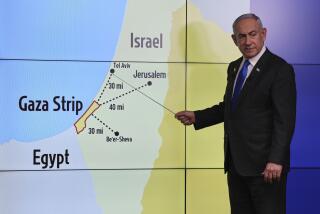Arafat Rejects Proposal for Limited Withdrawal
- Share via
WASHINGTON — Palestinian Authority President Yasser Arafat on Friday rejected as “peanuts” Israel’s limited proposals to withdraw its troops from the occupied West Bank and said at a news conference here, “It cannot be accepted.”
After two days of talks with the Clinton administration, Arafat described the peace process as “completely frozen.” He also angrily asserted that Israeli Prime Minister Benjamin Netanyahu has engaged in 34 violations of the U.S.-orchestrated peace process.
He specifically criticized his Israeli negotiating partner for the “Judaization” of Jerusalem and the West Bank by allowing Jewish settlers to move into Arab neighborhoods.
At a Council of Foreign Relations meeting later, Arafat expressed concern that, unless progress is made soon to break the impasse in the talks, “an explosion” could be triggered in the volatile Mideast. “The idea of peace is dying in the minds of Palestinians and Arabs,” he told council members.
Israel’s closure of its borders with the Palestinian territories now costs the Palestinians about $10 million a day in income, sparking deep frustration and anger, he said.
U.S. officials echoed that fear after a week of intense negotiations by President Clinton with both Netanyahu and Arafat. “If this deadlock continues, it could well lead to a downward spiral of violence,” a senior administration official said Friday. “It’s going to require real leadership by both sides to make the hard decisions that will avoid that from happening.”
American frustration is also growing. At her own news conference Friday, Secretary of State Madeleine Albright said of the peace talks: “We can’t go on with endless meetings, but we clearly are willing to have meetings that are necessary, that help the process along. But we want some results soon.”
Arafat called on other parties that signed the Mideast accords--including Russia, the European Union and Japan--to increase the pressure through political and economic means on Netanyahu to make advances in the peace process. “This is not a bilateral agreement just between Israel and the Palestinians but an international agreement,” he told the foreign affairs council, referring to the Mideast peace accords.
He said he is urging leaders in Europe, which he said accounts for 70% of Israel’s import and export market, to “wave” that card--economic pressure--as a prod to push the Israelis harder in the peace process. “They have much leverage,” he said of the Europeans.
*
Senior administration officials cited these as critical areas of difference between the sides:
* The scope and timing of Israeli troop redeployments from occupied territory. While the figures are rough and are subject to stiff negotiation still, Israel has suggested it might withdraw from less than 10%, while Palestinian officials have said they seek at least 30%. Israel also wants only one more deployment, while the Palestinian Authority expects two more withdrawals before the interim process is complete, a White House official said Friday.
* A “timeout” on settlements in disputed areas. Israel recently announced plans to expand existing settlements and build housing in traditionally Arab parts of Jerusalem; the United States has urged Netanyahu to take a timeout on such moves, which the Palestinians feel violate the 1993 Oslo accord.
* Security measures. The Israelis say the Palestinians have taken insufficient steps to prevent acts of terrorism against Israel; the Palestinians say they have cooperated with the Israelis and have tried to answer these concerns.
* The Palestinian covenant. Israel wants the Palestinian Authority to further reject a pledge the Palestinians made decades ago to destroy the Jewish state; Arafat gave the Americans a letter saying the Palestine National Council has voted to annul this vow but has not completed paperwork on the issue.
*
Albright said Friday that Arafat and Netanyahu now need time “to assess what they’ve heard” in their separate White House talks. “The president laid out a reasonable way to try to bridge the gaps,” she added.
Meantime, after an embarrassing flap about Arafat’s invitation to the Holocaust Memorial Museum, the Palestinian leader, in the end, lacked the time to visit it. Aides said his schedule kept him from touring the museum, with its exhibits about Hitler’s genocide of 6 million Jews. Arafat said he will take the tour on his next visit here.
More to Read
Sign up for Essential California
The most important California stories and recommendations in your inbox every morning.
You may occasionally receive promotional content from the Los Angeles Times.










